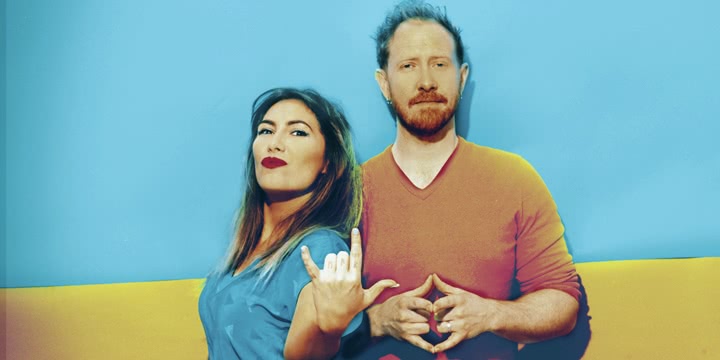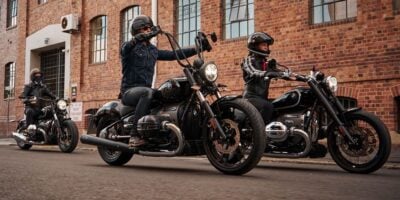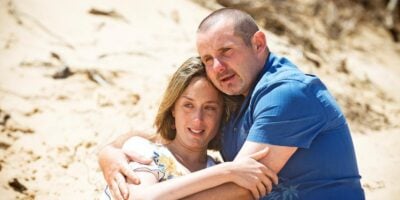Four years ago, in an interview with music blog It’s My Kind Of Scene, former Killing Heidi frontwoman Ella Hooper said of her beloved ’90s pop-rock group: “It really did just run its natural course and I think it would be very unnatural to start it up again now.”
But last year, in a suburban lounge room in Melbourne, something changed. The old gears clicked back into place, and within months, Killing Heidi were not just back, but locked in to headline a 2017 Twilight At Taronga set.
With the benefit of hindsight, Ella’s brother and co-founder, guitarist Jesse Hooper, can laugh off the comment, having recently assuaged his own doubts with the group’s first revitalised local shows.
“When we first started playing songs, there’s that nervousness of, ‘Will this feel awkward, will this feel like we’re pretending to be 15?’ – I think that’s where Ella’s quote comes from,” he says. “I guess what I’m really excited about now is that it doesn’t! It feels like we’re interpreting these songs with all these new skills and all these life experiences that we’ve had, and it doesn’t feel like we’re pretending to be teenagers; it feels like we’re playing these songs in a mature, fantastic, reinvigorated way.
“We’ve done the first three shows now, and we feel great. We love it, we come off so excited and the audience responses have been so positive that it’s reinvigorated it even more. We’ve been working really hard on rehearsing up the show because we have very high expectations of this, as we think other people do, so we’re really pumped. It’s even exciting to do press again!”
In the decade since Heidi disbanded, the siblings have been hard at work with their individual music careers – Ella as a solo artist, and Jesse as a teacher and producer with several respected Australian institutions – both of which now feed back into the band. The lineup returns with original drummer Adam Pedretti and “a couple of new friends joining us on bass and keys”.
“With [Ella’s] solo project, she’s done a whole bunch of songs and genres and ways of performing that she didn’t get through Killing Heidi, so she’s enhanced her craft so much more,” says Jesse. “The same with me – I’ve been collaborating with hip hop artists, refugee artists, soul artists and R&B artists, so I’ve learned a whole bunch about different genres that I never would have done. It’s almost like the souped-up ‘Heidi on steroids’ version that’s been amplified a hundred times from ten years ago. It really is the next level of Killing Heidi.”
One could assume working with family in such close proximity would naturally have its strains, but for Jesse, it’s so much a part of his life that he and Ella have found creative ease, using their bond to push their efforts further.
“As soon as we’d finished high school, we were in the band together for another ten years – it wasn’t till the last eight years or so that we stopped working with each other every day, so we don’t really have anything to compare it to,” he says. “But I guess we just have a great working relationship, we still drive each other crazy like brothers and sisters do sometimes, but I think we just have a really kinda shared vision for what we love to do in terms of music, and that’s a nice thing to come back to.”
The other source of pride for Jesse was his residency at Melbourne’s Artful Dodgers, a community arts program where he worked with disadvantaged youths and refugees to build their capacity as musicians and creatives.
“I was the resident musician there for three years and got to foster some amazing relationships with young people and create some amazing music,” he says. “One thing in particular was we worked with a Burundian hip hop duo who were former child soldiers who came here as refugees, and we got to produce and co-write a song with Paul Kelly and them called ‘Child Soldier’. That was a really nice way of me using my professional network in the music industry to make art with these two fantastic young former refugees, that I think just shows that you can bridge these gaps between the top end of the music industry and real grassroots emerging musicians.”
As the music program leader at Melbourne’s Collarts, and as a world-touring musician, Jesse has further honed his skill set while passing on his experience to a new generation of musicians. It’s a position and school of which he’s immensely proud, judging by the tone of his voice.
“[The students] are too young to have experienced when Killing Heidi was at its height of success, but they know some of the songs, and they can watch the YouTube videos,” he says. “There’s just the respect there that, you know, I’m not just a teacher – I’m someone who’s experienced working in the industry and having successes and writing hit songs, that I actually have some practical application. It’s not just about the theory of being a great musician – which is very, very important – but I can show them how to apply it in a contemporary music context, which is why Collarts is the best music university in the country by a mile.”
The kids must have watched some of those YouTube videos, too, because, like the press, all his students want to know one thing: are the red dreads coming back? “I think that’s the most popular question I’ve been asked in the last three months,” Jesse laughs. “I wish I could grow it back! They ask me about it every day.”
Killing Heidiplay Twilight at Taronga Zoo on Saturday February 4, supported byAbbe May.



































